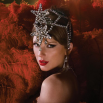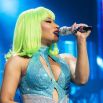What do you for your sophomore album when right out of the gate, your first single is an unexpected major hit? For Australian alternative rockers Atlas Genius, who hit it big with "Trojans" in early 2013, the answer is to take your time.
After rushing to release its debut album When It Was Now to ride off the success of "Trojans," for its new studio album, Atlas Genius tested things on the road, took a year off and took careful consideration for its new LP Inanimate Objects. Tomorrow (Aug. 28), the record will finally see its release. While the general pep and synth-heavy sound that Atlas Genius fans is maintained throughout the new record, Inanimate Objects also took a bit of a darker turn, and it's for the better of the band.
Music Times recently caught up with Atlas Genius' Keith Jeffery to talk all things Inanimate Objects, including incorporating the band's high energy live show, bridging the gap between '80s and '90s rock and following up an alt-rock smash.
Music Times: Can you tell me a little bit about the writing and recording process for Inanimate Objects?
Keith Jeffery: It started as a longer process than the When It Was Now album because we actually took more time to do this. The way that the first album happened, we released the first song out into the world and didn't really know that there was going be any demand because it was just an independent release. When "Trojans" took off there was some urgency for us to finish an album because it wasn't even really a priority in our lives leading up to that point. But this time we took time off from touring, we had well over a year actually, and there were a bunch of things that we wanted to achieve. We wanted this album to be a little darker, a little more aggressive than the first album because I think that's where we were at personally. I know some of the influences that we were listening to at the time were just a little bit gritty, a little bit darker.
MT: What were some of the influences on there?
KJ: We actually went back to stuff we grew up listening to. I mean when I was a little kid I used to love guitar based rock, stuff like Led Zeppelin, Nirvana, Soundgarden and Smashing Pumpkins. And with that there's also a bunch of those classic '80s pop bands like Tears for Fears, The Cure were sort of in a league of their own. It's all little bit dark that what we did on the first album.
MT: I definitely got a lot of the '80s influence from there. That has been a huge trend in indie rock and pop in the past few years. Do you have any insight on why that's such a thing right now?
KJ: Of course there's always fashions that come and go and it probably is that. I think the other thing is that there's a lot of good sounds that were created and started in the '80s with the whole synthesizer boom. That was the real heyday of when Moog synthesizers and all the different brands were coming up with amazing synthesizers. What happened, I think, with a lot of '80s music is that it went too far down that certain path, it's such an '80s sound when you listen back to that era. It's very synth heavy, almost like guitars were just abandoned. It started to be on the nose, that's why the '90s revolution threw away the whole synthesizer but there was some great stuff in there.
So I think a lot of musicians in the last few years have rediscovered that there's so many great textures that you can get from synthesizers and that '80s sound. But we're not totally going down that route of being 100 percent synthesizers and drum machines. There certainly are some artists that do just that but for me what I like is that the '90s had this really aggressive sound but there was a beautiful songwriting and texture in the '80s, so putting the two together in a new way I think is what really interested us.
MT: The thing that interested me most about Inanimate Objects is that in a time where everything is so singles focused, the record flowed really well; it was seamless. What that a conscious effort when you were tracking the record or did it just so happen?
KJ: Well the sequencing was something that we really focused on after the album was done because you never know how a song is going to turn out as you're doing it and whether it's going to get to the final place that you want it to get to. It's almost futile to try and sequence things before, but afterwards there was a real conscious effort to make it feel like it was a single journey. That's the hard thing for me because the album is an album and we just have certain singles that we release it. It's almost like showing somebody a few scenes throughout a movie and not letting them see the whole movie. I had mild anxiety where I would love people to be able to hear the entirety of the album as opposed to just pieces but that's just the world we live in, that's just the way that they do it.
Read also: energy of your live show
KJ: Yeah that was a conscious decision. We were such a new band when we toured last time so all the songs were done in isolation. We hadn't road tested them so to speak so it was just songs that we liked and we put them on the album. This time just having done all that touring we did consciously check in on what we were doing and we saw fundamentals. "How would this translate live?" "What would we want this to be if we were playing this right now?" So that's why there's a certain swagger on songs like "A Perfect End" or "Friendly Apes." They have got those bigger moments and we think they've got a bit more of a groove to them and that was definitely something that we wanted to achieve.
MT: Atlas Genius played at Central Park with the Kooks a couple months ago and you played a bunch of your new material live. How does it feel to roll out these new singles?
KJ: Well, I remember as a music fan that whenever I went to see band, if they played too many of the new songs, that I was always a little disappointed. But for us there was just such a great temptation that we couldn't ignore to play these new songs because you know, you've been working on these things for a year and it's always exciting to play the new stuff. So we tried to space them out throughout the set with songs that people did know but it felt good. Considering that people at that point had probably only heard one song off the album, I felt like it actually was good and I'm excited to start touring in the next few weeks once the album is actually out and people know the entirety of the album.
MT: As you mentioned earlier you had a lot of surprise success right away with "Trojans" and your debut album. Did you worry at all going into Inanimate Objects about a sophomore slump? And how did you try and combat that?
KJ: Well it's more external. It was more of people coming up and saying "Oh you worried about the sophomore slump?" "Well I wasn't really until you brought it up," you know? But there were so many things that we were more confident that we could achieve on this album as we went into it. I didn't really think back to that first album, like anything you do creatively when you revisit it there are certain things that you would change. So we took that and we knew there was a lot of things that we wanted to achieve. I didn't think about that too much, it was more like what's the right thing for that particular song, or that particular moment of the certain song you're working on.
So I didn't spend much time focusing on that. There is certainly nothing positive that can come from freaking out about the pressures of doing a second album so we tried not to focus on that.
MT: In the artwork for the record and in the "Molecules" audio on YouTube there is the lightbulb symbol. Why did you go with that visual for this record?
KJ: Well we have an artist over here in Los Angeles who did the artwork for the record and we really loved his stuff. We have for a couple years. So we had played him a bunch of the songs and said, "After hearing this go away and create something that truly represents what your hearing." And he came back with this image of a flashbulb against these clouds and it was just so surreal that it felt right. We can't even put into words why it felt right. That was his choice to use this lightbulb and it seemed to tie in well for us. We threw it out to him and that's what he sent back and we loved it so that's what we used.
MT: What kind of things did you tap into for the subjects on Inanimate Objects?
KJ: Well a lot of it was autobiographical, and when I say that, it's not as literal as say certain artist like the Arctic Monkeys, who are very literal. There's nothing left to the imagination with some of their lyrics.
I tried to keep a certain level of ambiguity just because I enjoy songs where I interpret it my own way. So they all came from things that happened over the last few years. Whether it was personal relationships that were thriving or struggling, be it romantic or platonic. Most of those came from those situation. Songs like "Friends With Enemies," "Levitate," they are very personal songs to me and I have very strong images of where I was when I was going through that. I tried to give a sense of that without being too literal so that everyone can interpret it their own way.
© 2025 MusicTimes.com All rights reserved. Do not reproduce without permission.




